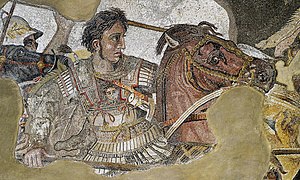
Back Alexanderzug ALS حروب الإسكندر الأكبر Arabic بؤیوک ایسکندر ساواشلاری AZB Войни на Александър Велики Bulgarian Alexanderzug German Πόλεμοι του Μεγάλου Αλεξάνδρου Greek Guerras de Alejandro Magno Spanish جنگهای اسکندر مقدونی Persian Chronologie des campagnes d'Alexandre le Grand French מלחמותיו של אלכסנדר הגדול HE
| Wars of Alexander the Great | |||||||||
|---|---|---|---|---|---|---|---|---|---|
 Alexander, depicted with his horse Bucephalus, fighting Persian king Darius III, from the Alexander Mosaic of Pompeii (Naples National Archaeological Museum, Italy) | |||||||||
| |||||||||
| Belligerents | |||||||||
|
Macedonian Empire • Hellenic League |
Balkans: | ||||||||
| Commanders and leaders | |||||||||
| Casualties and losses | |||||||||
| More than 1 million[1][2][3] | |||||||||
The wars of Alexander the Great (Ancient Greek: Πόλεμοι του Μεγάλου Αλεξάνδρου) were a series of conquests carried out by Alexander III of Macedon from 336 to 323 BC. They began with battles against the Achaemenid Empire, then under the rule of Darius III. After Alexander's chain of victories, he began a campaign against local chieftains and warlords that stretched from Greece to as far as the region of Punjab in South Asia. By the time he died, Alexander ruled over most regions of Greece and the conquered Achaemenid Empire, including much of Achaemenid Egypt; he did not, however, manage to conquer the Indian subcontinent in its entirety according to his initial plan.
Despite his military accomplishments, Alexander did not provide any stable alternative to the rule of the Achaemenids,[4] and his untimely death threw the vast territories he conquered into a series of civil wars commonly known as the Wars of the Diadochi.
Alexander assumed kingship over ancient Macedonia following the assassination of his father, Philip II (r. 359–336 BC). During his two decades on the throne, Philip II had unified[5] the poleis (Greek city-states) of mainland Greece (with Macedonian hegemony) under the League of Corinth.[6] Alexander proceeded to solidify Macedonian rule by quashing a rebellion in the southern Greek city-states and staged a short but bloody excursion against the city-states to the north. He then proceeded east to carry out his plans to conquer the Achaemenid Empire. His campaign of conquests from Greece spanned across Anatolia, Syria, Phoenicia, Egypt, Mesopotamia, Greater Iran, Afghanistan, and India. He extended the boundaries of his Macedonian Empire as far east as the city of Taxila in modern-day Pakistan.
Prior to his death, Alexander had also made plans for a Macedonian military and mercantile expansion into the Arabian Peninsula, after which he planned to turn his armies to Carthage, Rome, and the Iberian Peninsula in the west. However, the Diadochi (his political rivals) abandoned these plans after he died; instead, within a few years of Alexander's death, the Diadochi began a series of military campaigns against each other and divided the territories of the Macedonian Empire among themselves,[7] triggering 40 years of warfare during the Hellenistic period.
- ^ Arrian (1884). The Anabasis of Alexander; or, The history of the wars and conquests of Alexander the Great. Literally translated, with a commentary, from the Greek of Arrian, the Nicomedian. Cornell University Library. London, Hodder and Stoughton.
- ^ Arrian (10 April 2018). The Anabasis of Alexander. Ozymandias Press. ISBN 978-1-5312-8444-2.
- ^ Staff, HistoryNet (17 September 2007). "The Battle That Saved Western Civilization: Alexander vs. Darius". HistoryNet. Retrieved 3 October 2024.
- ^ Freeman, Charles. The Greek Achievement: The Foundation of the Western World. Allen Lane, 1999. ISBN 978-0-7139-9224-3. p.172: "In scope and extent his achievements ranked far above that of the Macedonian king, Alexander ("the Great") who was to demolish the empire in the 320s but failed to provide any stable alternative."
- ^ Bowra, C. Maurice (1994) [1957]. The Greek Experience. London: Phoenix Orion Books Ltd. p. 9. ISBN 978-1-85799-122-2.
- ^ Sacks, David, (1995), Encyclopedia of the Ancient Greek World, London: Constable and Co. Ltd, ISBN 978-0-09-475270-2, p. 16.
- ^ Strudwick 2013, p. 97.